#and instead of being Joaquin Phoenix he was a completely different guy who actually looked like Napoleon
Text
Last night I had a dream where my friends and I went to this weird cinema to see the deleted scenes from the Ridley Scott Napoleon movie and it was just this ten minute long artistic montage of Napoleon being sad and wandering around thinking emo thoughts about how lonely he was and then he tried to drown himself in a swimming pool.
#and instead of being Joaquin Phoenix he was a completely different guy who actually looked like Napoleon#and at the end everyone starting crying and clapping because it was such good 'artistic cinema'#anyways in the same dream I also joined a cult because they threw me a birthday party so idk what was going on with my brain#napoleon 2023#Napoleon
13 notes
·
View notes
Text
May 6, 2021: The Martian (2015) (Recap: Part One)
We’re leaving lo-fi sci-fi, people. Kind of.
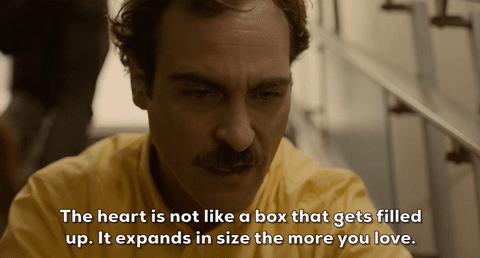
I mentioned before that films like Her are what I define as “lo-fi sci-fi”, which is a category that I’ve kind of made up. Basically, it’s the science fiction version of low fantasy, meaning it contains science fiction themes contained within an otherwise contemporary setting. In the case of Her, Joaquin Phoenix’s character, along with many others, live in a world and setting basically like ours, but with technology advanced enough to generate AIs (like Siri) that are intelligent enough to actually ascend our reality. Because we live in a society.
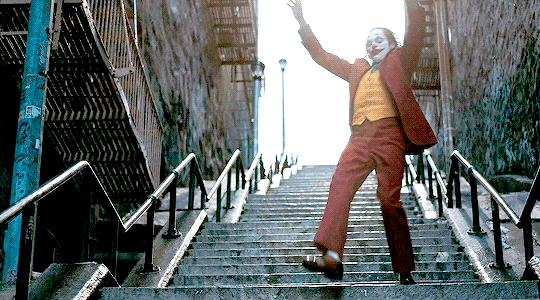
You give me Joaquin Phoenix, I’m gonna make a Joker reference; it’s in the contract of my existence. Anyway, that is admittedly kind of broad, right? I mean, that has the capability of crossing over with a BUNCH of sci-fi genres and themes. And, considering that we’ve already seen magic, speculative technology, time travel, monsters, and artificial intelligence, we’ve already touched on quite a bit.
And with science fiction, the sky’s the limit. Literally. So, I think it behooves us to re-examine lo-fi sci-fi a little bit. Specifically, we should note that it can also be defined as an extension of currently existing technologies and possibilities. Writers would call this “speculative sci-fi”, assuming in this case that it’s set within the present or a near and attainable future. Her definitely fits in this category, as does Westworld. But, let’s crossover to another genre by speculating upon another possibility. And it begins with this man. Probably.
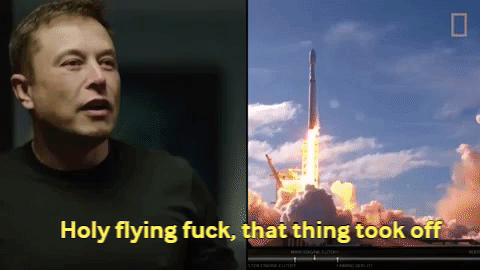
Hey, Elon, what’s up? Now, Mr. Musk here is a...controversial figure, for COMPLETELY understandable reasons. Instead of touch upon the man himself, I feel like touching upon one of his recent focuses: space travel. With SpaceX and the various upcoming space trips and journeys that they’re planning, Musk has made it clear that he plans to shoot to the Moon. Again, literally.
In fact, this full plan is to go even further than that, and to fuel potential commercial space flights in the future, which is admittedly very cool. And of course, if you’re going to shoot for the Moon...

Guys...guys, that’s Mars. THAT’S FUCKING MARS
Is that not amazing? We have sound and pictures from FUCKING MARS! THAT’S A DIFFERENT PLANET, GODDAMN IT! It’s cooler than I have the ability to properly express, but it IS goddamn cool. And this means that, easily within my lifetime, we could (and likely will) land on Mars. Which is amazing. God, I really want to see that happen.
And so, landing on Mars is BARELY science fiction, but since we haven’t yet done so...yeah, it’s fictional at the moment. And so, any film about landing on Mars falls within this category. Well...to an extent.

2000′s Mission to Mars, for example, was a Disney-funded film (to my IMMENSE surprise; and it’s based off of an old Disney World ride, WHAT), and a movie that I saw a LOT when I was a kid. I also barely remember it, to be honest. But that film is straight-up science fiction because of, well...aliens. The idea of Martians is, as far as we know it, fictional. And most fiction involving Mars includes these aliens somehow. Whether it’s DC Comics’ entire civilization of Martians, as seen in Justice League, Supergirl, or Young Justice...

...Sir Arthur Conan Doyle’s heavily mythologized civilization, as seen in the Barsoom series of novels (and another Disney film)...
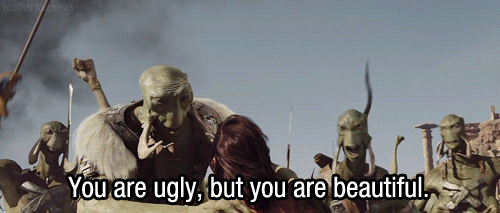
...Or one of the best Looney Tunes characters.
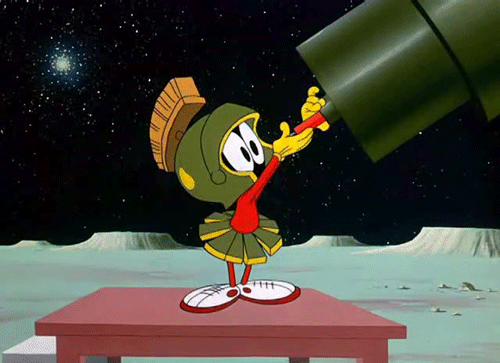
Mmm. Yes. Isn’t that lovely?
But, yeah, Mars and aliens go hand-in-hand in our media. So, to properly look at lo-fi science and speculative science fiction in relation to the Red Planet, we’ll need a movie that goes to the planet, and doesn’t touch upon the concept of aliens AT ALL.
Enter...Ridley Scott?
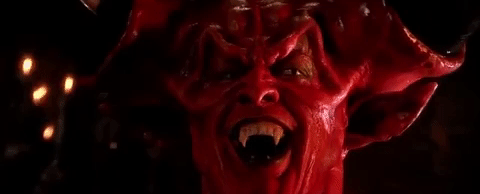
Yeah, the director of Legend, Alien, Thelma and Louise, Blade Runner, Gladiator. Also the director of Kingdom of Heaven, Prometheus, Exodus: Gods and Kings, and...ugh, 1492: Conquest of Paradise. I’ve talked about his mixed record before, in my Recap of Legend right here.
In 2014, he was brought on to adapt a book by Andy Weir called The Martian, which is a great book! I’ve listened to the audio book, and I whole-heartedly recommend doing that. And because of that, I am VERY MUCH looking forward to watching this film, especially seeing as it’s often called one of the best science fiction films made during that year, and was critically acclaimed then and now. It got seven Oscar nominations (although it won none of them), amongst other awards. So, enough navel-gazing, huh? The Martian!
SPOILERS AHEAD!!!
Recap (1/2)

On Acidalia Plantitia, at the landing site of the Ares III mission, a group of scientists are gathering samples. These scientists are commander and geologist Melissa Lewis (Jessica Chastain), pilot Rick Martinez (Michael Pena), systems operator Beth Johanssen (Kate Mara), surgeon Chris Beck (Sebastian Stan), German chemist Alex Vogel (Aksel Hennie), and overly talkative botanist Mark Watney (Matt Damon).
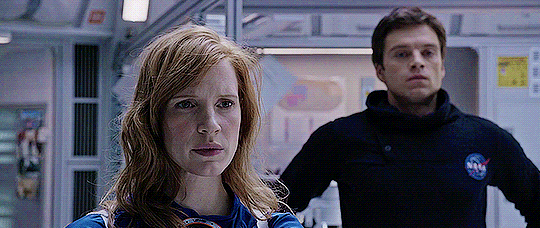
The group seems to have a good dynamic, but that dynamic is interrupted by a massive dust storm, which is large enough to cause the entire crew to evacuate. However, in the chaos of the dust storm, Mark is hit by debris and lost in the shuffle. Although Lewis goes back to find him, she can’t get to him before they need to leave, and Mark is believed dead. This is reported (pretty callously) by NASA Director Teddy Sanders (Jeff Daniels) to the press soon afterwards.
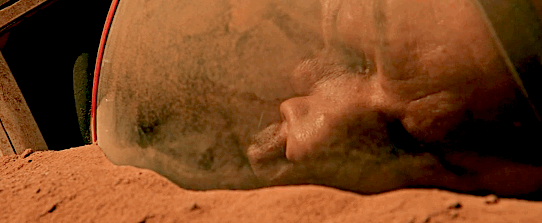
But of course, that wouldn’t be much of a movie, now would it? Mark’s alive! And Mark’s alone. With his suit damaged, and low on oxygen, he trudges back to headquarters, which is intact and still contains breathable oxygen. He gets inside, and realizes that he’s been stabbed in the abdomen by some debris. He removes it, and stitches up his own wound. Which is...god, it’s fucking BRUTAL just to think about, nevertheless watch.
Once he’s finished, he records a log for the future, if he doesn’t make it. It’s day 19 of the 31-day mission at this point, and Mark’s basically screwed. He needs lasting oxygen, water, and food, and he might need that for 4 years, when the next manned mission can come to the red planet. Additionally, he has absolutely no way to contact NASA, leaving him completely stranded. Another dust storm rolls in that night, and Mark looks over the belongings of his colleagues, packing them up for their eventual return. It’s somber, to say the least. However, Mark affirms that he’s determined not to die on the planet.
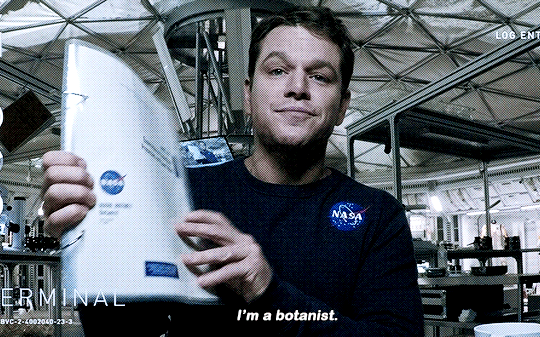
After doing the math, Mark should have enough food to last him for about 300 days, especially if he rations it. Until then, he’ll need to figure out how to grow his own food, on a planet where nothing grows. Which is, of course, going to be a difficult feat to accomplish. But Mark Watney’s a botanist with botany powers, and he’s gonna do it.
It’s day 31, and Mark’s brought in dirt from the outside, and uses the bio-waste from the crew’s stay there for a form of compost. After 5 days, mostly full of him watching Happy Days on TV and trying to farm, he realizes that he needs water, both for himself and for the soil. To do that, he goes chemical and decides to use hydrogen-laden rocket fuel, wood from Martinez’s belongings, and good old-fashioned fire to make water! And since hydrogen + oxygen = water, it should work. With a minor side-effect.
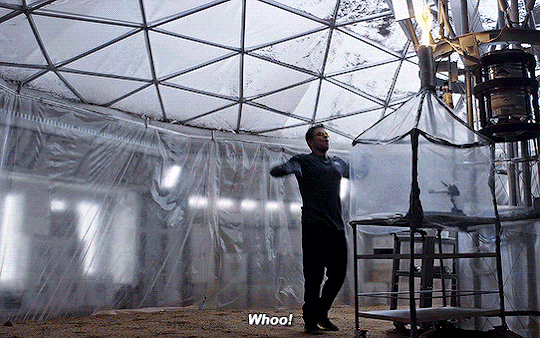
So, yeah, he blew himself up. As as he records a video log, the sound mixing makes itself impressively known by subtly and realistically generating a tinnitus sound. It’s VERY well-done, holy shit. Anyway, he makes a stable fire, and the place is soon covered in condensation, moistening the room and the soil successfully.
We get to day 54, and Mark’s planted leftover potatoes from the crew in order to grow them. And while he’s being mourned at a funeral on Earth, and in NASA, he’s seeing the fruits (or shoots) of his efforts.

Back on Earth, Mars Mission Director Vincent Kapoor (Chiwetel Ejiofor) is trying to convince Director Teddy to let him lobby for another Ares mission, despite the risk of bad press for the callousness of the proximity to Watney’s death. Meanwhile, satellite technician Mindy Park (Mackenzie Davis) looks down at the Ares III site, and realizes that the site has changed visually, meaning that Mark may actually be alive.
Shocked by this, she tells Kapoor, Teddy, and media director Annie Montrose (Kristen Wiig) about this, and they realize the absolute clusterfuck that this whole thing is. They can’t tell the other members of the Ares III crew about it, because it’d devastate them for the 10 months they have to get back to Earth, at the VERY least. They can’t tell the WORLD about this, because they just had a funeral for the guy, and they’d reveal that they left him stranded on Mars accidentally, destroying faith in the Mars Missions Program. And they can’t save Mark, who they’re sure will starve eventually. It’s a mess. And Kapoor also wonders what’s happening to Mark psychologically through all of this.
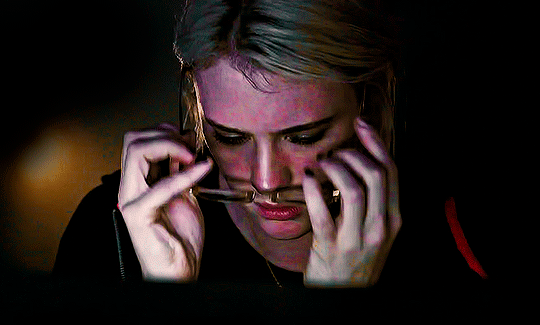
And yet, they reveal this to the world regardless, causing the clusterfuck reaction that they think it’s going to cause. But Mark’s busy on Mars, figuring out how to get to the site of the next Ares IV mission in 4 years, at the Schiaparelli crater about 50 days travel away. This is a struggle, as his Rover has only so much power and fuel, and he can only get more power by cutting out the heater is risking death by freezing. So, problems. However, he figures out a potential solution: radioactive isotopes! In a move that is, let’s face it, COMPLETELY INSANE, he digs up a radioactive generator from the ship in order to heat the ship.
On Earth, they try to figure out Mark’s moves, as well as how to resupply Ares IV sooner for Mark’s benefit. This is with the director of JPL, Bruce Ng (Benedict Wong), and the flight director of the ship Hermes, Mitch Henderson (Sean Bean), who insists that they tell the Ares II crew. They continue to monitor Mark, and note that he’s been travelling for 17 days in his Rover towards something. Kapoor figures it out, and flies to California.

See, Mark needs a way to contact NASA, and he believes that the way to do so is through Pathfinder, the first probe ever sent to Mars in 1997, lasting for 9 months since landing until they lost contact. Mark digs it up, and the people at JPL in California start their own efforts for contact. And despite communication being extremely rudimentary, initially limited to yes/no questions that use a still-frame camera, it fucking WORKS! WHOO!
To boost this communication hurdle, the two camps figure out a hexadecimal system for communication, allowing them to communicate using a circular table of numbers that represent an alphabet. That allows them to teach Mark to hack into the Rover, allowing it to piggyback off of its broadcast signal and send them messages via keyboard. Nice! Now that communication is reasonably possible, Mark’s able to ask how the crew is handling his death. But upon learning that they haven’t told him. He’s understandably a little goddamn enraged. And so, they FINALLY tell the Ares III crew about this.
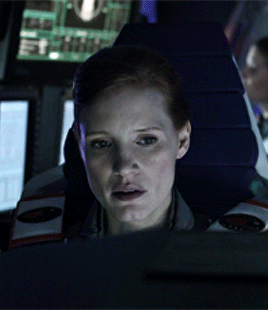
The news breaks the crew, even though Mark continues to stress that he’s all right, and that it wasn’t their fault. Meanwhile, Mark’s able to survive for 912 days with his potato plants, and things improve with the help of technicians on Earth. They plan to launch a supply rocket to him in the next year, and things are looking fine! Unless, of course...something goes horribly HORRIBLY wrong.

Well...fuck. Good place to pause for Part Two, then?
#the martian#ridley scott#matt damon#jessica chastain#kristen wiig#jeff daniels#sean bean#michael pena#chiwetel ejiofor#benedict wong#science fiction may#sci-fi may#user365#365 movie challenge#365 movies 365 days#365 Days 365 Movies#365 movies a year#bookstofilm#whatelsecanwedonow
13 notes
·
View notes
Text
OK, so in honour of my top posts now being me saying at various degrees of length that Arthur is gay (hashtag mylegacy, lmao…), I thought I should just go for it and actually dive in a bit a lot into why I read the character as gay. Now, usually all the justification I need to read a character as gay is “wouldn’t it be cool if this character I like/relate to/etc were gay like me?” and “it’s OK, officer, I do what I want”, and I’m well aware that 99% of the time it’s me using my own creativity to do a resistant reading + the film/book/whatever bumbling into subtext entirely by accident. And while I definitely don’t think there’s ever any more justification needed for any kind of LGBT reading, lol, as it comes to Arthur, obviously feel free to disagree with me, but I honestly think my read of him as a gay man is entirely textually supported, however unwitting and accidental that might have been on the part of the filmmakers (mind you, I don’t think it was Todd Phillips’ conscious intent, but I’m like… 85% sure Joaquin Phoenix knew exactly what he was doing).
(ETA that this is extremely long, so I’ve put it all under a cut.)
First of all, there’s of course… pretty much the entirety of Joaquin Phoenix’s performance (a very, very small sample can be found in my he gay son tag and just generally in my arthur fleck tag, ha), from his mannerisms to his physicality to the way he interacts with other characters. I know part of it is a function of wanting to go back to the character’s campy roots (which are themselves… you know…), and I know I’m relying on stereotypes to some extent, but first of all, you can’t divorce either camp or gender non-conformity from LGBT history and existence, and secondly this is literally how characters have been coded as gay throughout the entire history of cinema. What I’m saying here is that you can’t have a character who acts like Arthur does, literal limp wrist and all, or says “come on, Muuuurrrayyy, do I look like the kind of girl clown who could start a movement” the way he does, to pick one of many, many examples, and not evoke the long history of cinematic wink emojis at People Like Me.
That in itself would… honestly be plenty, lol, but it could be chalked up to, idk, Joaquin Phoenix doing his own thing, were it not for the fact that it’s completely reinforced at every turn by the filmmaking language, even down to his wardrobe choices, and it’s worth noting at this point that the framing is always one of empathy — albeit with nuance — and affording the character subjectivity, rather than being “ew, look at this gross [homophobic slur]”. Like, the very first time we see Arthur, literally our first impression of the character, he’s at a mirror, putting on make-up and then ruining it by crying, and while the make-up is of course part of his job, this is just not how the inner crises of straight male characters are expressed in the language of cinema. Of note too is the fact that he’s clearly visually separated from his co-workers in all the scenes at Ha-Ha’s, indicating his alienation from them, and while this could be chalked up purely to his disabilities, I don’t buy that that’s the only reason, given that Gary gets shit due to his dwarfism, sure, but at the end of the day he’s clearly “one of the boys” in a way Arthur (can’t be) isn’t.
There are honestly so many examples of the framing working to separate Arthur from conventional masculinity and heterosexuality that I’m just going to pick some highlights, such as: obviously, the way he expresses himself emotionally through dancing (to the point that one of his coworkers explicitly ribs him about it, “if your dancing doesn’t do the trick”), which again is not something that straight male characters do in the language of cinema. The fact that all the media we see him consume is musicals, classic comedies and a talk show he’s obsessively fannish about and watches with his mother — and we know he’s a fan of the show as a whole, not just Murray, hence him saying “I love Dr Sally” (and the way he says it…). Or, speaking of his media habits, when he’s dancing with the gun while watching Shall We Dance, this could have so, so easily been about him ~regaining his lost masculinity~ through, say, fantasies of revenge or badassery, but instead it’s about him being acknowledged as a great dancer and punishing bad dancers, and it all ends in slapstick anyway.
Also, while I’m on this topic, I want to address the nature of Arthur’s dissociative fantasies about Sophie. Honestly, I don’t read them as indicative of genuine romantic/sexual interest at all, because the film frames them as identical to Arthur’s more deliberate daydreams about Murray. I mean, not that I’m adverse to gay readings of that if that’s what you want to do, lmao, but to me they’re both very clearly post-traumatic fantasies of having another person look after you for once, of having someone value and cherish you and take care of you emotionally (which obviously has massive appeal if you’ve been dealing with the after-effects of catastrophic trauma all your life but nobody has given a shit about your suffering and you’ve had to be the one to look after other people to boot). Note that after the get-together with Sophie — which is clearly patterned after all those old comedies and musicals Arthur watches — the Sophie fantasies are incredibly platonic and involve things like having another person be there for you in a crisis, telling you something supportive, getting you a hot drink (in contrast with the reality of the hospital scene, in which Arthur is alone and he’s the one trying to comfort someone else, i.e., holding Penny’s hand), essentially no different from fantasy!Murray hugging Arthur and knowing exactly what to say to make him feel good about himself. Also note that both fantasies involve being the object of someone else’s affection, Murray picks Arthur out of the audience and Sophie comes to him, it’s a pillow princess Cinderella fantasy, more than someone loving you it’s about being loved. (And, once more, this could easily have all been v. v. different, the Murray fantasy could have been the much more conventionally masculine fantasy of being a famous comedian and being invited on Murray’s show, the Sophie fantasies could have had an undeniable sexual component, etc.)
Anyway, to get back to the general point of cinematic framing, again if the movie didn’t want me to read Artie as gay, it shouldn’t have had a pivotal moment in his character arc be him sitting at his mother’s vanity table, doing a new make-up look which involves using her lipstick, and then having a Moment while he’s literally holding a quasi-glamour shot of her.
And the thing is, all these reams of stuff aren’t even the key piece of the puzzle for me, which is the way in which the film as a whole can be read as a gay narrative. I’ve posted before about how part of the emotional catharsis of the film is about Arthur finally shamelessly embracing and even revelling in all his freakishness and socially-despised traits, a big one of which being what is arguably his effeminacy and… honestly I don’t need to explain how that’s a classic gay (and more generally LGBT) narrative, do I? Like, there’s a reason why a pivotal scene is Arthur having his hair-dyeing underwear rave in a flat that’s suddenly incredibly bright and sunny for the first time, it’s about reclaiming the pain and ugliness of your life and your circumstances into a space of potential liberation, which is honestly why this movie is always going to be incredibly personally meaningful to me for so many reasons, but definitely meaningful to me as a gay woman. (Again, this could so, so easily have been about him becoming some stone-cold badass or whatever, but instead the film has him dye his hair, put on a super garish new outfit and new make-up look, dance shamelessly in the street, and be incredibly campy on national television.)
More generally, there’s other aspects of the narrative arc that tie into this general theme and which also serve to continually distance Arthur from the conventional cinematic narratives of heterosexual manhood: for instance, once he starts fully embracing the Joker persona — which is… just Arthur, the crucial difference is in how others perceive him and how he perceives himself — any attraction to women, feigned or real, goes completely out the window and the only genuinely affectionate interaction he has with another human being is with Gary (I know we all love to joke about his first kiss being with Dr Sally, but it’s obviously Comedy Jokes and he doesn’t even kiss her for real, his make-up is completely intact; Arthur’s only real kiss in the movie is when he kisses Gary). Or, when Arthur’s personal narrative finally intersects completely with the larger social narrative — which is itself about upheaval, reclamation and potential liberation — the big triumphant moment is him once again dancing, this time for a cheering crowd, and using blood like lipstick to redraw his smile.
Or even, to a lesser extent, his whole sub-plot with his mother, before I watched the film I was worried that this was going to be the usual narrative about the henpecked guy who finally puts the bitch in her place as part of becoming a Real Man, and it’s not at all, quite the opposite, Arthur is not henpecked and is clearly in charge of the household, he genuinely loves Penny — and is confident she loves him back — and enjoys doing at least some things with her (them watching the Murray Franklin Show together), and up until the reveal any issues he has with her are largely the product of having to look after an ill person with zero social support and while working a physically and emotionally demanding job and dealing with his own disabilities. When he kills her, it’s a deeply sad and self-destructive scene and it’s the result of his profound anguish and sense of betrayal and he frames it as the bitter, trauma-haunted dark half of self-actualisation and self-acceptance (“that’s the real me”, “I haven’t been happy one minute of my entire fucking life”, “now I realise… it’s a fucking comedy”).
Or, at a more meta-textual level, the way the film is unabashedly both a pulpy thriller and a melodrama, just shamelessly embracing all its emotions, its pain and catharsis, without a trace of irony. Like, yeah, part of this is the immense sincerity and compassion Joaquin Phoenix brings to his performance, but it really is the movie’s approach as a whole, and when there is humour — and I do think there’s quite a lot of humour in the movie — it’s not the distancing, let’s-not-feel-anything-too-deeply-bro humour of your typical MCU movie, it’s the camp sensibility of laughing with and at your own tragedy. (Myriad examples down to the use of certain songs in the soundtrack.)
On a final note, you guys know how much I don’t care about authorial intent, but I feel compelled to point out that in his director’s commentary, Todd Phillips says, while discussing Arthur’s journey into becoming Joker, that he reads the larger pop-cultural character of the Joker as someone who doesn’t want women, and like… Again, it’s not like I think that he was deliberately making a gay narrative in any way, it’s just that if you’re creating this journey of a man who eventually becomes a character who’s not interested in women in that sense, you’ve also just ended up stumbling into a gay narrative accidentally on purpose, lmao, what’s the real difference between “at the end of the story, Arthur doesn’t want women because he’s ~da Joker now, baby, he doesn’t want anything~” and “at the end of the story, Arthur doesn’t want women because he’s gay and he’s no longer deeply repressed and closeted”?
Anyway, like I said, feel free to disagree, he’s a fictional character, lol, but this is where I’m coming from, and the reason why if everyone involved in the movie decided to make a statement tomorrow about how much Arthur Fleck wants to bone women I’d just say “shit, idc, I’m afraid you made a gay movie about Arthur Fleck, a gay man, it’s a little too late to retcon this bitch now ¯\_(ツ)_/¯”. Also this is over 2,000 words long what the fuck I am so sorry
#long post#joker 2019#class struggle clown movie#arthur fleck#dive down into chuckletown#he gay son#now in the form of 95 theses nailed to my tumblr#gonna make a letterboxd list called 'the author is dead this is lgbt cinema now'
27 notes
·
View notes
Text
Joker - Quill’s Quickies (No Spoilers)
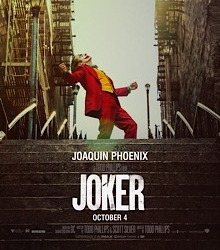
Joker is proving to be an extremely divisive film. Some think it’s the best thing since The Dark Knight. Proof that comic book movies can be art too. Others think it’s pretentious Oscar bait with nothing interesting to say.
And that’s not to mention the controversy surrounding the film as people wonder whether this will incite violence in white men (which I’m not going to touch with a barge pole, at least not here. I’ll do a separate Scribble for that sheer nonsense at some point). Needless to say everyone and their mums have an opinion on Joker... so I guess one more, won’t hurt.
Whether you like Joker or not I think depends on your tolerance for a) films that deliberately set out to make you feel uncomfortable and b) films that ask you to feel pity for the devil. (and I want you to remember that word ‘pity.’ It’ll be important later on). Personally, I loved Joker. I think it’s one of the most unique and groundbreaking comic book films I’ve ever seen. If you don’t like it, that’s fine. I can actually understand why to a certain extent. However don’t try to spin this as some ideological thing because that’s just disingenuous and stupid.
Lets start with the obvious. Joaquin Phoenix. Give this guy a fucking Oscar, for the love of God! His performance was truly mesmerising, particularly when he does finally don the full clown makeup. He is the Joker. The mannerisms, the attitude, the nihilism, it all just works. There’s even a monologue near the end of the film that could have been lifted straight out of the comics. This is a film that not only depicts the Joker perfectly, but also completely understands the character too.
The rest of the cast is exceptional too. Robert de Niro plays a chat show host who Joker looks up to and he does a good job. Deadpool 2′s Zazie Beetz plays a small but pivotal role as Sophie, Joker’s next door neighbour and ‘love interest’ and she’s excellent too despite having quite a small amount of screen time. Frances Conroy plays Joker’s mum Penny. Again a relatively small role, but a crucial one and she gives a memorable performance. Finally there’s Brett Cullen as a very different interpretation of Bruce Wayne’s father Thomas Wayne, which I think works extremely well in the context of this film and creates exciting possibilities for this world’s version of Batman, which we’ll probably never get to see because this is intended as a one off. Not that I’m complaining. I wouldn’t want them to do a sequel. This works perfectly as a standalone piece.
As I said, the supporting cast actually play a minor role overall as the film follows Arthur Fleck exclusively. The man who would be Joker. It’s a bit hard to talk about why I think this film works without giving away spoilers, so I’ll focus on how it made me feel.
Joker is an extremely tense movie. Todd Phillips’ stellar direction puts you in the mindset of the character and Hildur Guonadottir’s incredible music really elevates the film’s more disturbing moments. In fact (and I suppose you could call this a trigger warning), I did actually suffer from an anxiety attack halfway through the film because you’re constantly on a knife edge. As Arthur’s life falls apart, we see him become more violent and erratic to the point where he becomes legitimately frightening. Fear is of course subjective. I’m sure most of you have more of a spine than I do. But if you do suffer from any kind of anxiety, I would recommend psyching yourself up before you watch this and maybe have a friend or relative on hand to comfort you if it starts to get a bit much.
Seriously, I’m not kidding. Joker is an extremely uncomfortable experience and it’s unrelenting in how grim and unsettling it is. It’s R rated, but it’s not necessarily gory. It’s not as violent as, say, Deadpool, but its more bloody moments often come rather suddenly and with a lot of tense buildup beforehand. While it does bear similarities to movies like Taxi Driver and The King Of Comedy, those films have the audience on the outside looking in. Joker on the other hand takes the audience and locks them inside the Clown Prince of Crime’s mind for two hours straight, and quelle surprise, it turns out the inside of Joker’s mind is fucking horrible. Viewer beware.
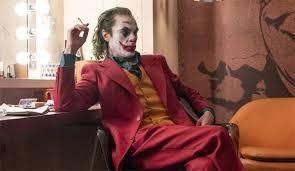
Okay, okay. I guess I can’t avoid it altogether. Do I think this film is dangerous? No. Do I think it insults those with mental health issues? No, in fact quite the opposite. I found the film to be quite sympathetic towards the mentally ill, presenting Arthur as being a dark outlier, not the norm. Do I think the film is making some sort of political statement. Again no. I honestly don’t think it’s saying anything about white people or toxic masculinity or gun violence or anything like that. In fact, if it is saying anything at all, it condemns those who seek to hijack a public figure for their own political agenda (which ironically is exactly what the press are doing with this very movie, but of course critics and journalists can’t see that because they have no self awareness what so bloody ever). The film is what it is. An extremely dark character study of arguably the most famous villain of all time.
Some have criticised the film as being too predictable, which I personally don’t think is a particularly valid critique. Like, yeah, of course it’s predictable. We all know what’s going to happen in the end. The fucking title kind of gives it away. It’s execution that counts, and Phillips and co have done a fantastic job in my opinion. As for those who complained that this film is cynical and nasty and made them feel numb afterwards... I mean... I honestly don’t know what you were expecting. Of course you’re feeling numb. That’s what the film wants you to feel. It’s cynical and nasty because the central character is cynical and nasty. That’s like criticising a comedy for being funny.
Honestly, if I had any complaints, it’s that I think they do paint the story with broad strokes, leaving very little room for subtlety. But having said that, this is based on a comic book about a billionaire who fights psychotic costumed criminals at night whist dressed as a bat. I don’t think subtlety has much of a place here.
Finally I just want to briefly touch on the concern that this film might make the character too sympathetic. First of all, that’s not necessarily a bad thing. Some villains can actually become scarier when we as an audience can empathise with them and understand their motives (see Killmonger in Black Panther). Second, and most importantly, Arthur Fleck/Joker is not a sympathetic character. Yes I did feel pity for him at times, but that’s not the same thing as sympathy. Like I said, this film completely understands the Joker. There are occasions where you do feel sad for the character and wish he could have got the right help, but most of the time (and the film emphasises this throughout) he’s presented as being a deeply disturbed and maladjusted individual and at no point is his behaviour ever justified. Instead it’s presented as being almost inevitable. That in a city as terrible as Gotham, what else could Arthur have become? Joker is a tragic character, but he’s not in anyway likeable.
I would definitely recommend you go and see this movie, especially if, like me, you’ve gotten sick of the slew of formulaic comic book movies and convoluted shared universes. If Joker is indeed going to be the first of an anthology series focusing on telling low budget, character driven, standalone, experimental films, then it’s a very strong start. Whether you liked Joker or not, the fact of the matter is the success of this movie can only mean good things for Warner Bros, DC, the comic book movie genre and the industry going forward, so please go and see this film.
62 notes
·
View notes
Text
Joker Review
*Disclaimer* I held off posting this review until Phoenix won the Oscar. I promised myself that if he hadn’t won, I would have just left this in the drafts forever. That’s how much faith I had in this man and now here is my critique of my favorite film of 2019.
I have a tattoo on my right arm. The tattoo is actually the Batman logo but altered. One half of the logo is normal but the other half is made up of red “HAHAHAHA’s” all over. There’s a reason why the dynamic between these two is my favorite of all-time. It’s two different interpretations of insanity colliding in an eternal battle. It’s two iconic, well-written, captivating characters having epic confrontations.
Needless to say, I love the characters of Batman and The Joker. I grew up on them and they have played a huge part of my life. My ideologies, my way of thinking, my perception of the world, my behavior in private and in public have been directly and/or indirectly impacted by these two characters.
Any film or any form of media that have these two, separate or together, is already met with my high expectations. So obviously, my expectations for this film were through the roof. If this film was nothing short of great, I would have been really angry.
I would have been the first to say how disappointed I was, I would have been the first to say that Joaquin Phoenix should never play The Joker again, I would have been the first to say that Todd Philips should stick to raunchy comedies and stay away from the character as far as possible....but that’s not the case here.
I’m singing a different tune. A tune that I’m gonna be letting everyone hear with every chance I get. A tune that I’m gonna be playing in my head whenever I dance on the street.
Ladies and gentlemen... please welcome Joker.

The Tragedy
First of all, I’ll begin with some faults that I found in the film. Not a whole lot but I have to get these out of the way so that I can end the review with high points.
1.) The origin story we didn’t want but the one we got anyway
Now when I talk about origin story, I don’t mean Joker’s. I mean Batman’s. I’m really sorry to say but I am getting absolutely sick of seeing THAT scene.
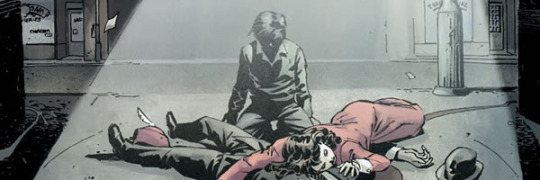
I have to point out that it felt like this scene was rushed. It wasn’t shot as well as the other scenes. Every other scene in Joker felt like there was a beautiful story behind it. As if there was a creative progress going through the minds of the people in the scene and off the camera but this scene felt rushed and was treated like an afterthought.
I must admit, of all the films that showed Bruce’s parents in the alley, this one might be one of the weakest I’ve seen in a while. Even that piece of garbage Batman V. Superman had a slightly better way of showing that scene. If you’re going to show us a scene that’s been overly done since the beginning of Batman films, you gotta add a little more flavor and cinematic flair to it. Sad to say that for a film that was shot so well, this scene stuck out like a sore thumb.
2.) A little too much dancing and a few too many ribs
As it says in the point, there’s a little too much there. Don’t get me wrong, I love most of his dance scenes but there’s maybe 1 or 2 too many. I personally would have kept the first dance scene when accidentally shoots a gun, the one after his first kill, the one with his mother, and all the dance scenes once he completely transforms. These particular dance scenes were showing us a slow evolution and allowed to see how his mind was slowly changing. But there were a few dance scenes that didn’t really do that and instead was just kind of there. For example, the few dance scenes where he’s half-naked can be taken out completely and it wouldn’t make a difference.
And speaking of him being half-naked. I understand the film wants us to see how weak he his and in some scenes, it wants to show you the literal scars he got from society. However in some of these scenes, it gets a little distracting. The first scene where he’s half naked and trying to adjust his shoe is just perfect because for one, you don’t know really know what he’s doing at first so it leaves you wondering for a few seconds and two, you get to see how much his frail body struggles with something so simple.
But then you have a few scenes where he’s unnecessary shirtless like the one where he’s smoking and watching TV. It seemed needless for him to be shirtless for this scene because the main point of it was his reaction towards what was being shown on TV. Again, it’s no problem to show us how skinny and weak he looks but it has to be the point or a point of a scene or else it’s just distracting.
Small gripes but I had to find some criticisms for the film. But now that that’s out of the way, let’s put a smile on that face (I know they’re not the same. Just be like Joe and Chill).
The Comedy
1.) Romero, Nicholson, Ledger, Hamill, and now...

...Phoenix
There have been numerous people who have played the Joker with each actor adding their own twist to the Clown Prince of Crime. Romero embodied the camp and goofiness of the Silver Age iteration, Nicholson provided a more laid-back and mafia-esque performance, Ledger portrayed him as a true anarchist who “wants to watch the world burn”, and the legendary Hamill basically performed multiple layers of Joker’s persona for his 20+ years as the character and is THE definitive voice (and laugh) of The Joker.
Joaquin Phoenix joins this hall of fame (or infamy) by giving us a closer, more in-depth look at the mentally ill, physically battered, and emotionally abandoned man behind the smile.
I honestly can’t give this guy the praise he really deserves but I’ll do my best. My lord...this man blew me away like I was a talk-show host. Powerhouse performance doesn’t even begin to describe his acting.
This film, as well-made as it was, wouldn’t have worked nearly as well had it not been for its main star. This film hinged on how well Mr. Phoenix played the titular character and he absolutely delivered.
The film had a tough job in its hands: portray how a man was slowly dissenting into madness to the point that he lets the madness in and indulges in it. It was going to be a deliberately slow process that required an actor who can be significantly subtle enough to convey to the audience how a character is evolving but taking small steps to do so. Phoenix did that with flying colors.
If you look at the first scene where we’re introduced to Arthur, it’s clearly not the same Arthur when the film reaches its ending. We went from a man who walks with a slouch and a noticeable stiffness to a man who vigorously dances in the streets without a care in the world.
Don’t get it twisted, though. Phoenix didn’t play two different people nor did he play a man who takes a sudden huge leap in his personality. He played a person who displays slight changes to his psyche in each scene and these small changes eventually pile up. Arthur was meant to be a man who was layered like an onion and Phoenix’s performance mirrored that perfectly.
Is he the best Joker? I can’t say that. Each Joker I’ve been introduced to, while having a different spin, is ultimately the Joker at his peak or even at the twilight of his criminal life. This is the first time where I’ve witnessed a Joker who is still truly staring out. And no, Nicholson doesn’t count because Jack Napier was an established criminal way before he became the Joker. So I’m not too sure yet where to rank Phoenix’s actual full-blown Joker as it doesn’t last long however excellent it was AND a huge factor for me when it comes to ranking Jokers is the interactions with Batman. There was no Joker and Batman clash here. Only Arthur and Bruce. As it stands, Phoenix’s spot on the all-time Joker list may not be the highest but in terms of pure acting, he may very well be #1.
I know this sentiment has been repeated multiple times but I do honestly believe Phoenix deserved the Oscar here or at least a nod.
2.) Familiar punchline, fresh set-up
For any Batman/Joker fan, you’ve probably heard of this following quote:
“If I’m going to have a past, I prefer it to be multiple choice.”
It’s an iconic quote and one that you will hear in almost any review of this film but there is a good reason for it. The line encapsulates one of the best things about The Joker: the mystery of his origins.
As mysterious as the character is, it’s hard to keep The Joker interesting these days. He is the most over-exposed Batman villain of all time and quite possibly the most over-exposed villain in fiction period. Comic books, video games, tv shows, live-action movies. The Joker has been in EVERYTHING. Like his heroic counterpart, the Joker has been exposed too much to the point that there’s really not a lot of fresh things you can do with him.
The last time any media brought something refreshing to The Joker was in Telltale’s Batman video game where you meet a man named “John Doe” who’s still looking for himself and finding out which path in life he wants to take. In the game, whatever John becomes is based on your actions. That was in 2017.
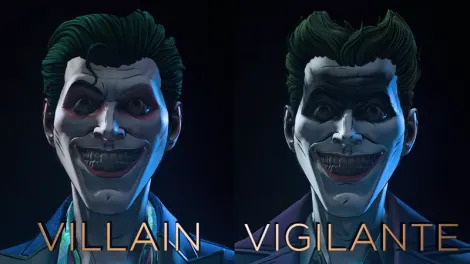
The last time before that was in 2011′s Flashpoint where Martha Wayne became The Joker in an alternate timeline where Bruce dies in the alley. Even though this version of the Joker had a clear backstory and no mysterious origin, it was still fresh because of the sheer novelty of seeing Bruce Wayne’s mother as The Joker and his father as Batman.

So there are stretches of time where there’s nothing new and exciting for The Joker character but I’m happy to say that this film does breathe new life into the character.
The filmmakers understood how this specific character should be handled and they did it in ways that are plausible. His abusive but vague childhood and his delusions help in keeping the film from being straightforward.
Let me give some examples. In the scene where Arthur steals his mother’s files in the Asylum, it’s said that he was adopted by Penny and that he was abused by one of her boyfriends.
Some people I’ve talked to believe that it was Thomas Wayne who put Penny in the Asylum and forged adoption papers. Some people even say that it was Thomas Wayne who abused them when Arthur was a child. Some people say that it’s true and Arthur really was adopted.
We don’t know these things definitively and that’s the best part. It’s whatever you want it to be. Multiple choice.
I personally want to believe that Arthur really was adopted because that just adds another air of mystery to him. If he was then we don’t know his actual birth name or who is real parents are.
All in all, even though the evolution of Arthur into The Joker remains the ultimate goal, the film lets you make up your own path into how he got there. It’s handled beautifully and the script is clearly made with a lot of knowledge of and love for the character.
3. A problem tackled with grace
I just wanted to point how well this film handles the issue of mental health and illness. This topic will forever be relevant and is an issue that’s been tackled in media before. Some handled it terribly, some handled it bad, some handled it ok, some handled it well. And then there’s Joker that handles it amazingly.
As someone who sees mental illness on a regular basis, it was so sublime how accurate this film was. The image of a decaying mind and one that descends further and further down is so powerful in this film and it just never half-asses it and I loved that.
My girlfriend is a nurse and she interacts with mentally ill people far more than I ever will and she praised it more because everything she saw from Arthur is something that she has personally had to deal with in her patients. I asked her if there was even one inaccurate and she said “No” because everything was completely plausible and has actually happened in real life on multiple occasions. Delusions of grandeur, uncontrollable ticks (like a laugh), murderous tendency, self-harm, stalking, hallucinating, you name it and most likely, this film shows it.
Not only is Arthur’s mental illness accurate but what makes it better and why I praise it is how others deal with him. It’s scary how much it mirrors reality. Some people may know how to interact with him while others just get annoyed with him. Even those who are accepting of mentally ill people can still have be irritated with them when they come in contact with them.
Arthur is beaten not just because he’s mentally ill but because he just looks like a weak man who can be pushed around. People don’t care if he’s sick, they’ll kick his ass or make fun of him regardless and in some cases, they’ll have even more incentive when they learn he has mental problems which is sadly similar to the world we live in today.
Joker is arguably the best adaption of mental illness for this decade (I say arguably because Bojack Horseman is up there) and I can’t believe that the director of the Hangover films got it right and speaking of which...
4. He directed what??
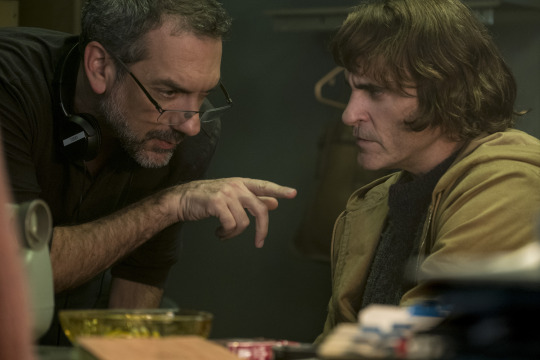
Todd Philips, the man behind the Hangover trilogy, Starsky and Hutch (2004), and Old School directed this film. Imagine late 2018 and you just heard who the director was and you search for the films he directed prior. Did you honestly believe, in your heart of hearts, he was going to pull this off?
Don’t get me wrong, comedic talents have proven to excel in other genres. Jordan Peele is a great example of that but that doesn’t necessarily apply to every comedian...However, it applied to Mr. Philips.
His direction, his vision, his execution was top-notch and I have to apologize to this man because I honestly doubted him when I initially heard about it. I knew Phoenix was going to do well and I thought that the film would just rely solely on his performance but no. Todd Philips deserves a lot of credit here. Yes, he takes some ideas and cues from Scorsese (not a bad inspiration by the way) but he handles the psychological aspect in his own style.
In terms of performers, this was close to a one-man show as you can get but Philips’ contributions behind-the-scenes should to be given as much appreciation. Phoenix was the master painter and Philips gave him the tools.
Honestly, if Philips wants to direct more dramatic and heavier films akin to this, I’m all for it. If he wants to stick around and maybe direct some more DC films, I am definitely on board. In this time of uncertainty towards DC films, Philips gave me hope. Yes, I know this film isn’t part of the DCEU but if they want to create more films in the Elseworld universe, Philips should still be part of it in some way.
5. The sound of laughter

I’m not going to lie. I rarely appreciate film scores. While I do believe they enhance a film’s quality, I’m not actively seeking it out unless it truly stands out. The only scores I truly remember and appreciate is the opening score for Star Wars, the Superman score, the main score for Indiana Jones, the Back to The Future action sequence score, Danny Elfman’s Batman score, and all of the scores from The Godfather films.
By the way I realized the first three examples I gave all sound similar but it makes sense since John Williams made them all.
So out of the hundreds (possibly thousands) of films I’ve seen, these are the only scores I can truly remember and now we add one more to the list: the dark and beautiful score by Hildur Guðnadóttir.
She absolutely gave me a much better understanding of how music can not only enhance a scene but be worked around it. Apparently, the music was made first and Todd Philips would shoot scenes with the score playing in the background so that he can craft scenes based on which part of the score he was listening to. This is the first time something like this has ever happened in the filmmaking process and it absolutely worked wonders. No wonder why each scene tied in so beautifully to a specific part of the score.
Hildur has made it and I hope to hear more of her work in future projects.
6. To a bright future (hopefully)...

This section is more of a call to action than a positive point for the film. That being said, Joker’s success has opened up many possibilities for DC films moving forward.
Let’s be honest here. The recent attempt of DC keeping up with Marvel in terms of films has not been great. DC is Marvel’s biggest competitor but when you just look purely at movie success, you wouldn’t think that.
That’s because Marvel started something solid over a decade ago and is currently having the biggest and most epic film franchise today and, quite possible, of all time.
DC tried (and is still trying) to do the same but it has been a roller-coaster with some enjoyable ups (Man of Steel, Wonder Woman, Shazam) and terrible downs (Batman V. Superman, Justice League, Suicide Squad, Birds of Prey).
Now with the huge commercial and critical success of this film, Warner Bros. need to take advantage of this while they have the chance. Joker is a film that is set in its own universe and not a part of the bigger DCEU and this could be DC’s way of being as successful as Marvel. Elseworld stories. Detective Comics was the first to put huge emphasis on a multiverse in their comics and I believe it’s time to bring that to the films.
They’ve already implemented a multiverse with the television shows but now is the time to let the silver screen experience this.
Unlike Disney, Warner Bros. has the movie rights to ALL of the DC characters. All of them. From heavyweights like Superman and Batman to less popular characters like Question and Red Tornado. They need to make use of that advantage because there are plenty of characters who have not had successful film ventures yet. Green Lantern, Martian Manhunter, Batgirl, Constantine (sorry Keanu) Lobo, Zatanna, Static Shock, Booster Gold (a personal favorite) and so many more. Give these characters a chance. They can shine in their own standalone movie that doesn’t have to do with the DCEU. However, if you want to put all of them in the same universe, you’ll need visionary writers capable of that.
Consider this my call to action for Warner Bros. because I’m admittedly more of a DC fan than a Marvel. Don’t get me wrong, I love both franchises but DC was my first so I am biased towards them. I’m happy that Marvel has continuous success but it also makes me melancholic because it makes me question why DC can’t experience the same.
Only time will tell if DC can keep this up because right now, they’re doing well overall but even if they ultimately never catch up, they can be proud of this one.
Overall...
I love this film and its portrayal of an iconic character. They took an overused and overexposed character and somehow made him fresh again without taking away what made him so popular in the first place.
Todd Philips had a vision and he took it to a level that I didn’t think he was capable of. Joaquin Phoenix just absolutely killed with a performance that’s going to be remembered forever.
As I write this review, talks of a sequel have already begun. I’m honestly not sure if they can do outdo themselves. My expectations will be even higher but they are most certainly welcome to exceed them again.
3 notes
·
View notes
Text
Why Joker Is Facing Backlash Despite The Great Reviews

Todd Phillips' Joker movie is receiving great reviews, so why is it also facing a backlash? The DC movie, which stars Joaquin Phoenix as the Clown Prince of Crime, premiered at Venice Film Festival this weekend, and was also screened for critics elsewhere, and the early reviews for Joker have been very positive.
Phoenix stars in Joker as Arthur Fleck, a would-be stand-up comedian in Gotham City who, after a series of failures and setbacks, finds himself turning to a life of crime and becoming more deranged while he's at it, which sets him on the path to becoming the Joker. Directed and co-written by Phillips alongside Scott Silver, Joker has been on many most anticipated lists since its first trailer dropped, showcasing a very different kind of comic book movie.
Related: Joker Final Trailer Breakdown: 13 Last Minute Story Reveals
As per the reviews, that's what Phillips, Phoenix et al have delivered with Joker, which received a standing ovation in Venice, and yet online the discourse about the movie has already started to sour, with multiple backlashes and controversies emerging before the film has even been properly released.
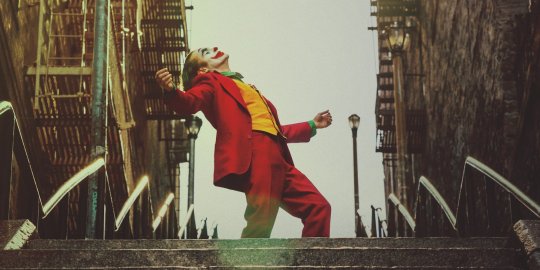
Joker's backlash started before anyone had actually had a chance to see the movie, and instead came when the script leaked online. Despite the fact that this was just a script, and even if real not necessarily the most up-to-date version, it led to some general unhappiness and ill-feeling towards the film online from those who read it, because Joker isn't going to be a typical comic book movie.
Many who read Joker's script weren't happy with the direction it was going in, which represented a shift away from the version(s) seen in the comics and previous DC movies. There was talk that it was going to make the character of Arthur Fleck too sympathetic; that its handling of more topical or political issues was way off; and other controversial elements that we'll not mention outright here for sake of spoilers, but needless to say made some big deviations from what's generally known or accepted about the Joker.
A lot of Joker's script, and the backlash to it, seems to be that it wasn't what people expected or wanted from the film. Of course, the script was an early one, and Phillips has since confirmed Joker's script changed, and it doesn't include the fact that direction, performances, and just about everything else can elevate a weak script into a good movie. What's on the page and what ends up on the screen are often very different things, but that didn't stop people being unhappy with Joker's script.
Related: Film Festival 2019 Preview: 12 Biggest Movies With Oscar Chances
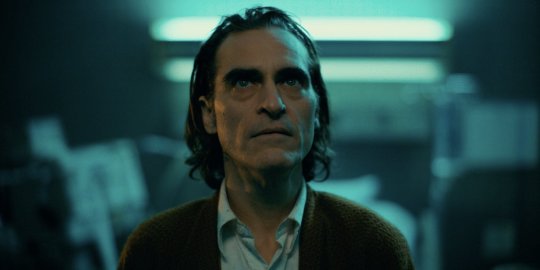
Something that was noted by reactions to Joker's leaked script, but has definitely gained more traction now that critics have seen the film, is the idea of Joker being a dangerous movie. Joker is about a man who is rejected and deals with that in a very violent, aggressive way, and it has been suggested by various critics that the film could lead to people taking the wrong message from it: that it actually supports incel culture, and that it could lead to acts of terrorism. That's not to say that Joker openly encourages such acts, but that it could be interpreted that way by the wrong person.
There is some historical precedent for this, in fairness. One of the biggest inspirations for Joker, and a film it's long been compared to, is Taxi Driver. When John Hinckley Jr. attempted to assassinate President Ronald Reagan in 1981, Taxi Driver formed part of his delusional fantasy that triggered the incident. Hinckley Jr stated that his actions were to impress Jodie Foster, whom he was obsessed with, and he had copied the hairstyle of Travis Bickle, while his attorney even played Taxi Driver in court as part of the defense.
In more modern times, and within the DC universe, there was a shooting that took place during a midnight screening of The Dark Knight Rises. At the Century 16 cinema in Aurora, Colorado, a gunman - James Eagen Holmes - opened fire on the theater during the movie, killing 12 people and injuring 58 others. According to initial reports, Holmes identified himself as the Joker at the time of his arrest. That was only seven years ago, and since then the political climate and numbers of mass shootings have only worsened, so it's understandable why there might be some concerns over Joker.
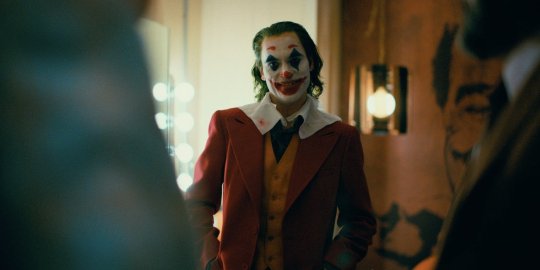
Joker was always going to be a controversial movie in some way. He's too big and popular a character, not to mention too disturbed, for there not to be people unhappy with how things turned out for one reason or another, whether it was Phillips' direction, Phoenix's performance, changes to the character, or something else entirely. DC movies have long been divisive, so it was fair to assume Joker might be too. But it's the reasons for the backlash to Joker that don't seem completely warranted.
Related: IT and Joker Can Save Warner Bros' Disappointing 2019
Firstly, it's harsh to judge any movie based solely on a draft script. As mentioned earlier, there are so many factors that go into a movie, on top of there being no guarantees it was the version of the script they shot, that it's impossible to say a movie will be bad simply by reading what's on the page. Joker is, according to most reactions, a good-to-great film, and it should be judged by people who have actually seen it; there's little point critiquing a work of art without knowing what it's like.
The second point is a little more delicate. On the one hand, it isn't completely unfair to point out that a movie might have a serious negative impact on a person who is already vulnerable. Joker contains themes and images of violence, revenge, loneliness, anger, masculinity, and much more, all of which could be taken in the wrong way. But is that a reason to criticize, condemn, or "cancel" the movie itself? This risks taking things into murky territory with regards to censorship and who a film is "acceptable" for, calling to mind the BBFC banning The Texas Chainsaw Massacre, which was deemed "all right for you middle-class cineastes...but what would happen if a factory worker in Manchester happened to see it?" It's also similar to the frequent backlashes to violent video games, despite research showing no link between video games and violence or aggression.
In this sense, Joker does feel like Taxi Driver or Fight Club, where yes, there are people who will take the wrong message from it. But is that the fault of the creator? David Fincher made Fight Club as a satire of toxic masculinity that does not paint it in a favorable light, so is it a failing of his as a filmmaker that there are people who hold it up as a celebration of it instead? How much should Joker sacrifice its own story in order to hammer its point home? Going into the movie, the title along should be clear that this is about a character who is a bad guy, since the Joker is one of the most famous villains in pop-culture history, and one there's very little mistaking for a hero, anti-hero, or anything else to be potentially looked up to. It's sadly true that there will be people who'll take the wrong message from it, but then those people would also take the wrong message from reading comics, or some other work of art. Movies are open to different interpretations, and while filmmakers should be responsible with what they're making, that doesn't preclude the fact that there could always be someone who can take it the wrong way. What matters most to the director is making a great movie, and there are far greater issues to address when it comes to acts of terrorism or just the culture of toxic masculinity than Joker.
More: Theory: Joaquin Phoenix Isn't The REAL Joker
source https://screenrant.com/joker-movie-backlash-reviews-explained/
0 notes
Text
The guy in Black’s very very first spouse, Vivian money, informs of love, heartbreak
The guy in Black’s very very first spouse, Vivian money, informs of love, heartbreak
A hyperlink happens to be posted to your Facebook feed.
The line was walked by them
Johnny money holds their ten dollars electric electric guitar. He offered devices home to home before auditioning for and signing with Sam Phillips at Sun Records in Memphis, Tenn. (Photo: Due To Scribner)
Tale Shows
Medications and June Carter, Vivian money writes inside her brand new book, ruined her marriage to music symbol Johnny Cash — and Carter, other people informed her, had been the greater amount of relentless of this two threats.
Vivian ended up being usually the one cast from the spotlight, put aside to boost her and Johnny’s four daughters in Ventura while he and June Carter became the master and queen of nation music in nearly storybook love design. Vivian became fodder limited to, as she writes, individuals interested in her past along with her famous ex-husband and people of this Nashville mindset whom wanted her “written out of Johnny’s history altogether. “
Now Vivian’s writing right back, as we say, in “we wandered The Line: My Life with Johnny, ” circulated this fall. By turns sad and uplifting, the guide is really an antidote that is sobering our celebrity-obsessed tradition and talks towards the oft-ignored fallout from popularity.
Inside it, Vivian confesses that she never stopped loving Johnny and wistfully ruminates about what could have been had medications and June not joined their life. One’s heart and establishing for a lot of that is Johnny and Vivian’s stint located in a hillside house above Nye path in Casitas Springs from 1961 to 1967, an interval containing several of the most colorful and worst for the popular guy in Ebony’s bad-boy behavior — the pills, the booze, the binges, the arrests and an infamous June 1965 woodland fire he set above Fillmore.
It had beenn’t very long once they relocated to Casitas Springs, Vivian writes when you look at the guide, “that everything, and I also suggest every thing, started initially to fall apart. ” While Johnny toured (often with June) and their popularity expanded, Vivian remained house.
“She’d say, with him instead of being here raising four kids, things would have been different, ‘” recalled longtime friend Alice Smith of Ventura if I only could have traveled. “She stated that many. “
Vivian remarried (Ventura police Dick Distin, whom nevertheless lives in the city) in 1968 and lived out her times in Ventura, a dynamic, admired and social person in the community. All four daughters she had with Cash — Rosanne, Kathy, Cindy and Tara — graduated from St. Bonaventure senior school in Ventura.
Vivian passed away in might 2005 at age 71, soon after completing the manuscript on her behalf days with Johnny.
In certain methods, her guide is just a retort towards the Oscar-winning 2005 film “Walk the Line, ” with Joaquin Phoenix as Johnny and Reese Witherspoon as June depicted in a love story that is dreamy.
The movie portrayed Johnny due to the fact pursuer that is aggressive June due to the fact reluctant one, but Vivian paints June while the chaser — most pointedly within the guide whenever she writes about an upset backstage conflict (in a unnamed spot) for which June believed to her, “Vivian, he can be mine. “
“She desired individuals to understand went after Johnny, ” said Ann Sharpsteen, who co-authored the book with Vivian june. “That was where nearly all of her discomfort and anger rested each one of these years. “
Vivian’s child, Cindy money, mainly will abide by her mom.
” Once June arrived, she relentlessly — well, she desired Dad and she would definitely get him, ” stated Cindy, who lives in Ventura. “And she did. She made herself really available, to where he pursued her back. “
. (picture: thanks to Scribner)
Truths associated with the triangle
Vivian additionally writes associated with discomfort of hearing claim in interviews that she was raising Johnny’s daughters june. She additionally claims June Carter had been a medication provider for Johnny, contributed to their addiction and ended up being additionally an addict. In which the absolute truth in all this work lies is probable buried: the 3 prongs associated with love triangle who is able to talk straight to it are typical dead — June Carter and Johnny money passed away in 2003.
Johnny money blessed the written guide and supposedly would definitely compose the foreword before he passed on.
But their fingerprints are typical on it. In reality, the majority of this uncommon memoir is authored by the guy in Ebony — completely 75 per cent for the 320-page book is love letters he published to Vivian as he had been an Air Force serviceman stationed in Germany from 1951 to 1954. The 2 had met at a roller-skating rink in her hometown of San Antonio and involved in a whirlwind three-week relationship before he shipped away to European countries.
Sharpsteen stated she and Vivian sifted through nearly 10,000 pages of love letters the 2 penned one another as they had been aside.
Vivian’s sis Sylvia Flye, whom proofread a number of the book, stated she had a basis for including numerous regarding the love letters.
“the film, in addition to articles, had portrayed Johnny and June as this love tale associated with the century, ‘” said Flye, an old regional resident whom now lives in Tulare. “She wanted to show they (she and Johnny) had outstanding love, too. She desired to show individuals she was not the ogre. “
Though Vivian never ever saw the film, she had been mindful, buddies state, that she ended up being depicted unflatteringly, nearly as being a shrew.
The book’s concluding area, for which Vivian is quite available in regards to the triangle, has raised eyebrows among her buddies. Though Vivian confided in certain of these, she ended up being a sort that is private frequently mentioned Johnny only if other people brought it.
The last component “was very enlightening if you ask me, ” stated Suzanne Dunn of Oxnard. Helen Boyd of Ventura stated Vivian shared with her some plain things but included, “it absolutely wasn’t hatred or venom or anything that way. And she did not talk hostilely about June Carter. “
Longtime friend Cynthia Burell noted that Vivian did not easy have it going right on through all of this, and keeping it straight right back such a long time also was tough.
“this is certainly a thing that’s been along with her for many years, ” stated Burell, a previous ojai town clerk and manager of finance whom still lives there. “It is extremely hurtful to possess another person say these people were increasing her four daughters; she raised those daughters. To be kind of overlooked ended up being really hurtful; it can have already been hurtful to anybody. As well as in her situation, it ended up being more serious because he had been a tremendously general public figure. “
It did harm her, said Cindy money. On that topic, her mom had been feeling and frustrated hidden. ” She wanted, Cindy stated, “to finally, finally have voice. “
Vivian and Johnny Cash married in San Antonio, Texas, her hometown, on Aug. 7, 1954, a bit more than the usual thirty days after their return from Air Force informative post responsibility in European countries. (Picture: Thanks To Scribner)
Recalling Vivian
Vivian filed for breakup from Johnny in summer time 1966; it absolutely was awarded in belated 1967.
But alternatively than being the shattered ex-wife, Vivian — at the very least outwardly — threw herself into life plus the community. She had been a three-term president of this Garden Club of San Buenaventura and did volunteer work with the county medical center and a property for unwed moms in l. A., on top of other things.
Those that knew her, from good friends to casual acquaintances, unfailingly talk of her in shining terms — kind, ample, right down to planet, socially engaging, a enhancing guru and an ace hostess, constantly prepared along with her trademark afghans and do-it-yourself treats.
“She actually had one’s heart of a saint therefore the knowledge of the queen, ” stated Katrina full bowl of Ventura. “I really never ever met a nicer person. “
Added Shirley Wilmot of Ojai, ” just How breathtaking she had been, inside and out. “
Boyd coordinated volunteers in the Ventura County clinic for a long time and remembers Vivian as “gracious, modest and a bit bashful. We liked her a complete lot. “
Vivian’s Ventura foothills house had a pool that is indoor ended up being impeccably embellished. She liked entertaining individuals there.
Stated Dunn, whom knew her through the Garden Club, “She had a sense that is innate of in her gown along with her house. “
Fran Diamond, the supervisor of Scott’s Apparel in Ventura when Vivian briefly worked here, called her “an all-around enjoyable individual. ” Opal Root worked alongside her at St. Bonaventure’s Fiesta fundraisers into the mid-1970s while her son and two for the money daughters had been in college there and remembers Vivian did whatever it took to assist the time and effort.
“She constantly had a grin on her behalf face, ” Root stated.
Smith, whom met Vivian through offering cosmetic makeup products, stated every space inside her home has one thing she designed for her. “If you knew Vivian, you’d certainly one of her afghans; this is the sorts of individual she ended up being, ” Smith said.
Source: https://showlex.site/2020/03/26/the-guy-in-black-s-very-very-first-spouse-vivian/
from WordPress https://showlexsite.wordpress.com/2020/03/26/the-guy-in-blacks-very-very-first-spouse-vivian-money-informs-of-love-heartbreak/
via IFTTT
0 notes
Text
EIGHTH GRADE
For his first feature film writer director Bo Burnham owes everything to Elsie Fisher his 14-year-old star who just completed her own eighth grade of middle school when production started. Burnham doesn’t owe A24, the distributor, not composer Anna Meredith, not cinematographer Andrew Wehde, not the editor Jennifer Lilly who has the most film experience here, all key people who can really impact a first time film director. No, he owes all of Eighth Grade to Fisher who allows Burnham to capture every ounce of her physical and mental being not so much in an exploitative way—though you might suspect that is the case since the film is reality based and highly stalking at times —but in a very anthropological way that in a positive sense schools people on what internet life is like at this age. Which is not that much different from everyone else who experienced eighth grade before Facebook, YouTube and Snapchat, in terms of social anxiety. Today it’s just a more penetrating, omnipresence of social concerns.
The Story: Kayla is in her final year of middle school. She’ll be graduating and heading to high school and we get to follow her and watch her as she navigates this delicate time in her life. Eighth Grade is a “day in the life” narrative-based fictional film about Kayla, an only child, who lives with her dad Mark, played by Josh Hamilton (The Meyerowitz Stories (2017), Manchester By The Sea (2016), Frances Ha (2012)), who does his best to stay in touch with his daughter; to allow her to do her thing while also being concerned for her wellbeing; trying to have conversations with her though she just wants to be left alone. And we see her desire to be accepted by the popular girls, while crushing on a boy, Aiden, played by Luke Prael, and in turn, her friend Gabe, played by Jake Ryan, who crushes on her.
The Goods: What Burnham does best is write accidental maturity into these kids. That Aiden the cool, dreamy kid doesn’t even know how magnificent he is to Kayla, though he’s really scrawny and thin, especially as he makes child-like grimaces and accompanying sound effects in class. Yet he’s one of the most popular kids. And that Gabe is a nerd but his seemingly inherent gentlemanly qualities brush off of him like a dog shedding hair. A kid, a child, but one who makes Kayla dinner and shares her concerns about the future.
Eighth Grade is not a John Hughes film, it is not a Disney film with kid actors from Disney Channel shows. It is not innocent comedic Napoleon Dynamite (2004) fun. And it’s not this year’s Lady Bird (2017) as some media outlets are saying. It sort of touches on all of the schematic pieces of these entities, such as capturing the ticks and sounds young people like to make, the natural dialogue of “likes” and “ums,” or the quirky clothing and hairstyles of kids and teachers, done here as well if not better than in Sixteen Candles (1984) or Welcome To The Doll House (1995), or in Richard Linklater’s Dazed And Confused (1993). And the subculture that exists in the hallways, between lockers. But Eighth Grade is dark, the lighting is dark, the music is at times cold and isolating, whether that is all done on purpose or whether it was created this way in post-production based on inexperienced filmmaking…it’s as if we’re on another planet. Which often times we are when trying to recognize and understand kids of this age, or ourselves, when we were in this limbo between childhood and adulthood.
And if you think of the world of Eighth Grade, whether it’s this film, or the actual moment in time—our actual eighth grade—it really is like a level of Dante’s Inferno and Burnham and the crew he works with here have nailed that in every scary, alienated, other worldly way without leaving the reality of the true situation. It’s not a documentary but it documents with accuracy this year in Kayla’s life, just as Michael Apted documented kids from seven years old and up…called the UP series, following the same people from age 7 to age 56, and is still going, and just as the Michael Apted title explains his long term biography project Eighth Grade does the same thing. It’s an anthropological title, a history term paper title, it’s a milestone, a moment, a term used for the eighth year of a child’s education. It can’t get any dryer than that. Like National Geographic, as their motto says, “to increase and diffuse geographic knowledge,” Eighth Grade, as would be fifth grade, or twelfth grade, or say the year in a college freshman’s life on campus, provides us with something more than just a Hollywood top 40 soundtrack movie with adolescent guys having sex with pies.
In that regard, Eighth Grade is more like Fish Tank (2009), written and directed by Andrea Arnold, a fictional slice-of-life look documenting the daily events of 15-year-old Mia who lives with her single mother which won the Jury Prize at the Cannes Film Festival. And yet not at all like Thirteen (2003), a well-lit professional-looking film shot in a handheld style that involves thirteen-year-old girls in a pattern of self-destruction, and stars Holly Hunter, again, a single parent. To further describe where Eighth Grade fits into the narrative film structure of this genre.
The original music in Eighth Grade, composed mostly of electronic music by Anna Meredith, adds more of a Nicolas Winding Refn (Valhalla Rising (2009), Drive (2011), The Neon Demon (2016)), feel at times. There is definitely a science-fiction underscore to the film. When we consider the effects the internet and social media have on Kayla’s young mind, the way Burnham captures late night screen time with Kayla, in bed, always with her purple earbud headphones on, sort of hiding from dad, and the world, in the darkness of her room with the single light of her cell phone…it’s no different than any other cold, electronic, robotic, A.I. image in any science fiction film dealing with lonely astronauts.
Or like in the films of Refn where the central characters are often loners where the camera follows them and stays with them all day allowing us—with electronic music—to crawl under their skin like nano bots and go along for what is usually a dramatically creepy ride.
The music proliferates the fantasies and fears of the young person experience, more so than music from a Hughes film, but not dissimilar to Sophia Coppola who does this quite well in nearly all of her films, using musicians like electronic synth-heavy bands and artists like Squarepusher, Air, Klaus Schulze, Oneohtrix Point Never and the more accessible Avicii, or deadmau5.
Even bigger, wide reaching films have an original electronic score most of which lends itself well to suspenseful or psychological moments, in recent films like Game Night (2018), score by Cliff Martinez, and Phantom Thread (2017), soundtrack by Radiohead guitarist Johnny Greenwood. Greenwood was nominated for an Oscar in the Original Score category for that film and recently scored Lynne Ramsey’s You Were Never Really Here (2018), which, starring Joaquin Phoenix, is much more common in tonality, music wise, electronically, to contemporary films like Drive, and Tron: Legacy (2010), and curiously Burnham’s Eighth Grade. Both films in fact—You Were Never Really Here and Eighth Grade—have tracks that are siren-like in their attempt to interpret scenes where sirens might be required for both a) the characters in the film, as sort of red flags, and b) for the audience in enhancing the “alarm” of character distress.
This kind of music is nothing new. Hans Zimmer of Inception (2010), Interstellar (2014), The Dark Knight Rises (2012), uses nearly all synthesizers and electronics; as does Steven Jablonsky, composer of the Transformer films. That same highly affective synthetic sound logic is found in the X-Files TV show and films, Scarface (1983), The Girl With The Dragon Tattoo (2011), the Blade Runner films, Hackers (1995), big film and TV stuff. But indie films too have a pedigree of electronic music as part of their original soundtrack. John Carpenter, the sci-fi and fantasy indie film king, composes a lot of electronic music for his films, the most noticeable and recognizable being the theme from his Halloween films, but also Escape from New York (1981), The Thing (1982), They Live (1988), Ghosts of Mars (2001), etc. And a near wordless action nail-biter like Terminator (1984) relies heavily on electronic music that drives the tension and suspense of that film like few others.
The point of all of this is two things: a) the electronic music you hear in Eighth Grade works against the character, is a cold partner to the artificiality and falseness of social media, and creates a subtext of “alien presence” in the sense the soundtrack synthesizer is the voice of a world outside of reality, at best symbolizing the world of overbearing self-consciousness young people exist in at this age, and b) if that is so, then the upside is that Kayla’s character beats this sound around her, rises above it and conquers this monster-alien’s monolith alarm warfare in times of greatest challenges within the film.
Even when we hear a contemporary song, like one from Selena Gomez or Katy Perry, it is not the party anthem of good times, one that appears on a soundtrack you can download on iTunes or buy at Walmart, but instead is often muffled in the film by kids conversing or by earbuds and quickly replaced by Meredith’s electronic composition which we surely come to recognize as representative of Kayla’s true psyche. And that music, it’s almost like the black alien goo from the Spider-Man comics which eventually takes over the bearer’s body and goes on to become Venom, taking over the mainstream pop music of Eighth Grade.
But Kayla rises above all that, and that is the film’s most successful aspect. It gives this character’s story a positive punch in the end.
The Flaws: My problem is it’s all just a little too dark, that the film goes to the dark side of eighth grade angst and isolation more than I’d like it to. Which makes the film stand out, I recognize that, and for which it also makes the film better than most in this category. I find the music a little too invasive, but that’s the point too…that all of this social media stigmata and middle school distress is overbearing. And the music gives the film a signature that neither Kayla nor the audience can shake. Is that what reality is like? Are we affected by technology and people around us, our place in society, to such a degree it gives us a mark of disgrace, of shame, and an aura of neurosis? I don’t think so. In reality. At least not permanently. But yes, in the movie, the electronic compositions are so strong they put a UPC code-like stamp on our Kayla that leaves us very little hope for a positive future. In that regard Eighth Grade feels more like a monster movie than a young adult drama.
Comedy is what we need a little more of here, if we wish to retain the sense of realism Burnham has done so well with here. If we could laugh at ourselves a bit more in Eighth Grade, laugh with Kayla, watch Kayla laugh a little at herself and some of her circumstances, not in a Fast Times at Ridgemont High (1982) way, or in a Clueless (1995), Amy Heckerling way, or in a Mean Girls (2004) way—but in a Matt Damon laughing at Robin Williams way in Good Will Hunting (1997), or in a Tom Berenger trying a stunt jump in The Big Chill (1983) way, or in a Rachel Getting Married (2008) wedding craziness relief like family toasts way…if we have these comedic personality traits in Eighth Grade, the comedy of life’s weirdest moments would seem more real than it does here in what we only see as a series of reactions that for Kayla express disappointment and embarrassment.
That realistic lighting and those humiliating parents and that awkward bathing suit at the swim party, that the prospect of a relationship with someone we have a crush on, those “realities” aren’t real enough in the end without the ability to laugh at something, anything, which is what kids do with their friends—seeking comfort from the madness of this time in our life. True, that doesn’t always happen. Some kids don’t get that outlet, the outlet of life-like friends, or sports, or after school programs…or that opportunity to vent while just hanging out with friends after school watching TV and laughing at body noises and funky odors. In the film Eighth Grade, we get a glimpse of that and see that Kayla does in fact have those options, yet we only really see her drop her guard, loosen up, on one or two occasions which are far outweighed by the more humiliating, self-conscious, constricting horrors in her head.
Working with limited budgets, cast, equipment, you’re talking a school full of kids, a community, a shopping mall, a high school where the eighth graders shadow high school students…sure, there are a lot of successful quantities here. And in that regard Burnham has made a great film. Correction, Elsie Fisher has made a great film, as laden as it is with oppressive dark matter of the universe.
The Call: Spend the ten. Eighth Grade is shy of being a master piece but it’s a fantastic dramatic debut for Burnham who by trade is a comedian. His previous directing work is with TV and cable comedy stand-up specials with the likes of Chris Rock, Jerod Carmichael and himself even though there’s rarely any comedy in this film. The original electronic music by Anna Meredith is at times mostly highhanded and sometimes terrorizing; the film could use a few more real-life comedic moments to punchline Kayla’s most difficult moments. But Elsie Fisher offers herself up for the cameras like a pro. Meryl Streep has nothing on her. It’s more than acting though. She’s sacrificing herself for the good of the film. Burnham has a lot to be thankful for. And so do we. Gucci!
Eighth Grade is still on the festival circuit and will receive a rating closer to release date. Running time is 1 hour and 34 minutes.
By Jon Lamoreaux
0 notes
Text
The guy in Black’s very very first spouse, Vivian money, informs of love, heartbreak
The guy in Black’s very very first spouse, Vivian money, informs of love, heartbreak
A hyperlink happens to be posted to your Facebook feed.
The line was walked by them
Johnny money holds their ten dollars electric electric guitar. He offered devices home to home before auditioning for and signing with Sam Phillips at Sun Records in Memphis, Tenn. (Photo: Due To Scribner)
Tale Shows
Medications and June Carter, Vivian money writes inside her brand new book, ruined her marriage to music symbol Johnny Cash — and Carter, other people informed her, had been the greater amount of relentless of this two threats.
Vivian ended up being usually the one cast from the spotlight, put aside to boost her and Johnny’s four daughters in Ventura while he and June Carter became the master and queen of nation music in nearly storybook love design. Vivian became fodder limited to, as she writes, individuals interested in her past along with her famous ex-husband and people of this Nashville mindset whom wanted her “written out of Johnny’s history altogether. “
Now Vivian’s writing right back, as we say, in “we wandered The Line: My Life with Johnny, ” circulated this fall. By turns sad and uplifting, the guide is really an antidote that is sobering our celebrity-obsessed tradition and talks towards the oft-ignored fallout from popularity.
Inside it, Vivian confesses that she never stopped loving Johnny and wistfully ruminates about what could have been had medications and June not joined their life. One’s heart and establishing for a lot of that is Johnny and Vivian’s stint located in a hillside house above Nye path in Casitas Springs from 1961 to 1967, an interval containing several of the most colorful and worst for the popular guy in Ebony’s bad-boy behavior — the pills, the booze, the binges, the arrests and an infamous June 1965 woodland fire he set above Fillmore.
It had beenn’t very long once they relocated to Casitas Springs, Vivian writes when you look at the guide, “that everything, and I also suggest every thing, started initially to fall apart. ” While Johnny toured (often with June) and their popularity expanded, Vivian remained house.
“She’d say, with him instead of being here raising four kids, things would have been different, ‘” recalled longtime friend Alice Smith of Ventura if I only could have traveled. “She stated that many. “
Vivian remarried (Ventura police Dick Distin, whom nevertheless lives in the city) in 1968 and lived out her times in Ventura, a dynamic, admired and social person in the community. All four daughters she had with Cash — Rosanne, Kathy, Cindy and Tara — graduated from St. Bonaventure senior school in Ventura.
Vivian passed away in might 2005 at age 71, soon after completing the manuscript on her behalf days with Johnny.
In certain methods, her guide is just a retort towards the Oscar-winning 2005 film “Walk the Line, ” with Joaquin Phoenix as Johnny and Reese Witherspoon as June depicted in a love story that is dreamy.
The movie portrayed Johnny due to the fact pursuer that is aggressive June due to the fact reluctant one, but Vivian paints June while the chaser — most pointedly within the guide whenever she writes about an upset backstage conflict (in a unnamed spot) for which June believed to her, “Vivian, he can be mine. “
“She desired individuals to understand went after Johnny, ” said Ann Sharpsteen, who co-authored the book with Vivian june. “That was where nearly all of her discomfort and anger rested each one of these years. “
Vivian’s child, Cindy money, mainly will abide by her mom.
” Once June arrived, she relentlessly — well, she desired Dad and she would definitely get him, ” stated Cindy, who lives in Ventura. “And she did. She made herself really available, to where he pursued her back. “
. (picture: thanks to Scribner)
Truths associated with the triangle
Vivian additionally writes associated with discomfort of hearing claim in interviews that she was raising Johnny’s daughters june. She additionally claims June Carter had been a medication provider for Johnny, contributed to their addiction and ended up being additionally an addict. In which the absolute truth in all this work lies is probable buried: the 3 prongs associated with love triangle who is able to talk straight to it are typical dead — June Carter and Johnny money passed away in 2003.
Johnny money blessed the written guide and supposedly would definitely compose the foreword before he passed on.
But their fingerprints are typical on it. In reality, the majority of this uncommon memoir is authored by the guy in Ebony — completely 75 per cent for the 320-page book is love letters he published to Vivian as he had been an Air Force serviceman stationed in Germany from 1951 to 1954. The 2 had met at a roller-skating rink in her hometown of San Antonio and involved in a whirlwind three-week relationship before he shipped away to European countries.
Sharpsteen stated she and Vivian sifted through nearly 10,000 pages of love letters the 2 penned one another as they had been aside.
Vivian’s sis Sylvia Flye, whom proofread a number of the book, stated she had a basis for including numerous regarding the love letters.
“the film, in addition to articles, had portrayed Johnny and June as this love tale associated with the century, ‘” said Flye, an old regional resident whom now lives in Tulare. “She wanted to show they (she and Johnny) had outstanding love, too. She desired to show individuals she was not the ogre. “
Though Vivian never ever saw the film, she had been mindful, buddies state, that she ended up being depicted unflatteringly, nearly as being a shrew.
The book’s concluding area, for which Vivian is quite available in regards to the triangle, has raised eyebrows among her buddies. Though Vivian confided in certain of these, she ended up being a sort that is private frequently mentioned Johnny only if other people brought it.
The last component “was very enlightening if you ask me, ” stated Suzanne Dunn of Oxnard. Helen Boyd of Ventura stated Vivian shared with her some plain things but included, “it absolutely wasn’t hatred or venom or anything that way. And she did not talk hostilely about June Carter. “
Longtime friend Cynthia Burell noted that Vivian did not easy have it going right on through all of this, and keeping it straight right back such a long time also was tough.
“this is certainly a thing that’s been along with her for many years, ” stated Burell, a previous ojai town clerk and manager of finance whom still lives there. “It is extremely hurtful to possess another person say these people were increasing her four daughters; she raised those daughters. To be kind of overlooked ended up being really hurtful; it can have already been hurtful to anybody. As well as in her situation, it ended up being more serious because he had been a tremendously general public figure. “
It did harm her, said Cindy money. On that topic, her mom had been feeling and frustrated hidden. ” She wanted, Cindy stated, “to finally, finally have voice. “
Vivian and Johnny Cash married in San Antonio, Texas, her hometown, on Aug. 7, 1954, a bit more than the usual thirty days after their return from Air Force informative post responsibility in European countries. (Picture: Thanks To Scribner)
Recalling Vivian
Vivian filed for breakup from Johnny in summer time 1966; it absolutely was awarded in belated 1967.
But alternatively than being the shattered ex-wife, Vivian — at the very least outwardly — threw herself into life plus the community. She had been a three-term president of this Garden Club of San Buenaventura and did volunteer work with the county medical center and a property for unwed moms in l. A., on top of other things.
Those that knew her, from good friends to casual acquaintances, unfailingly talk of her in shining terms — kind, ample, right down to planet, socially engaging, a enhancing guru and an ace hostess, constantly prepared along with her trademark afghans and do-it-yourself treats.
“She actually had one’s heart of a saint therefore the knowledge of the queen, ” stated Katrina full bowl of Ventura. “I really never ever met a nicer person. “
Added Shirley Wilmot of Ojai, ” just How breathtaking she had been, inside and out. “
Boyd coordinated volunteers in the Ventura County clinic for a long time and remembers Vivian as “gracious, modest and a bit bashful. We liked her a complete lot. “
Vivian’s Ventura foothills house had a pool that is indoor ended up being impeccably embellished. She liked entertaining individuals there.
Stated Dunn, whom knew her through the Garden Club, “She had a sense that is innate of in her gown along with her house. “
Fran Diamond, the supervisor of Scott’s Apparel in Ventura when Vivian briefly worked here, called her “an all-around enjoyable individual. ” Opal Root worked alongside her at St. Bonaventure’s Fiesta fundraisers into the mid-1970s while her son and two for the money daughters had been in college there and remembers Vivian did whatever it took to assist the time and effort.
“She constantly had a grin on her behalf face, ” Root stated.
Smith, whom met Vivian through offering cosmetic makeup products, stated every space inside her home has one thing she designed for her. “If you knew Vivian, you’d certainly one of her afghans; this is the sorts of individual she ended up being, ” Smith said.
from SHOW LEX https://showlex.site/2020/03/26/the-guy-in-black-s-very-very-first-spouse-vivian/
0 notes